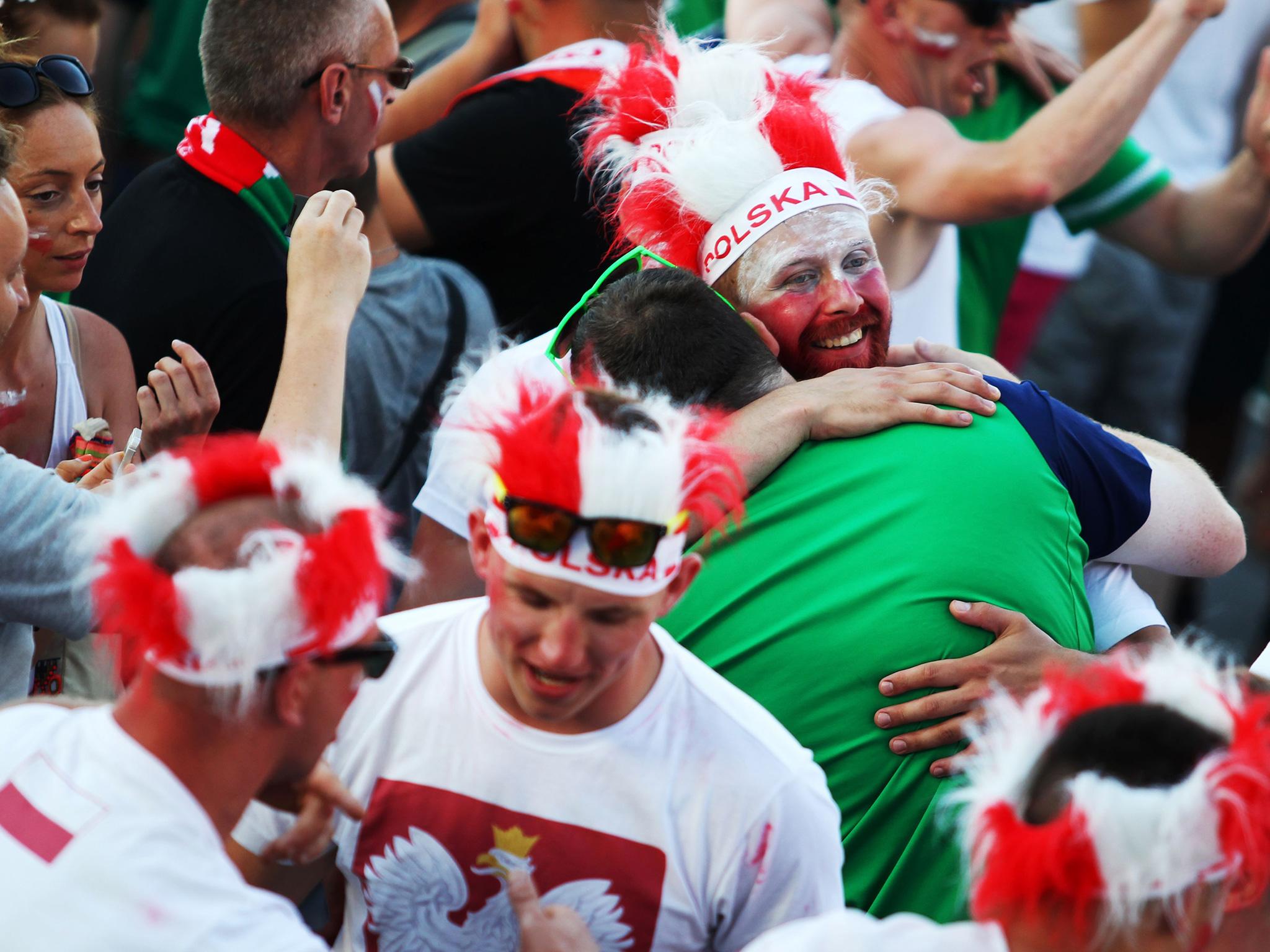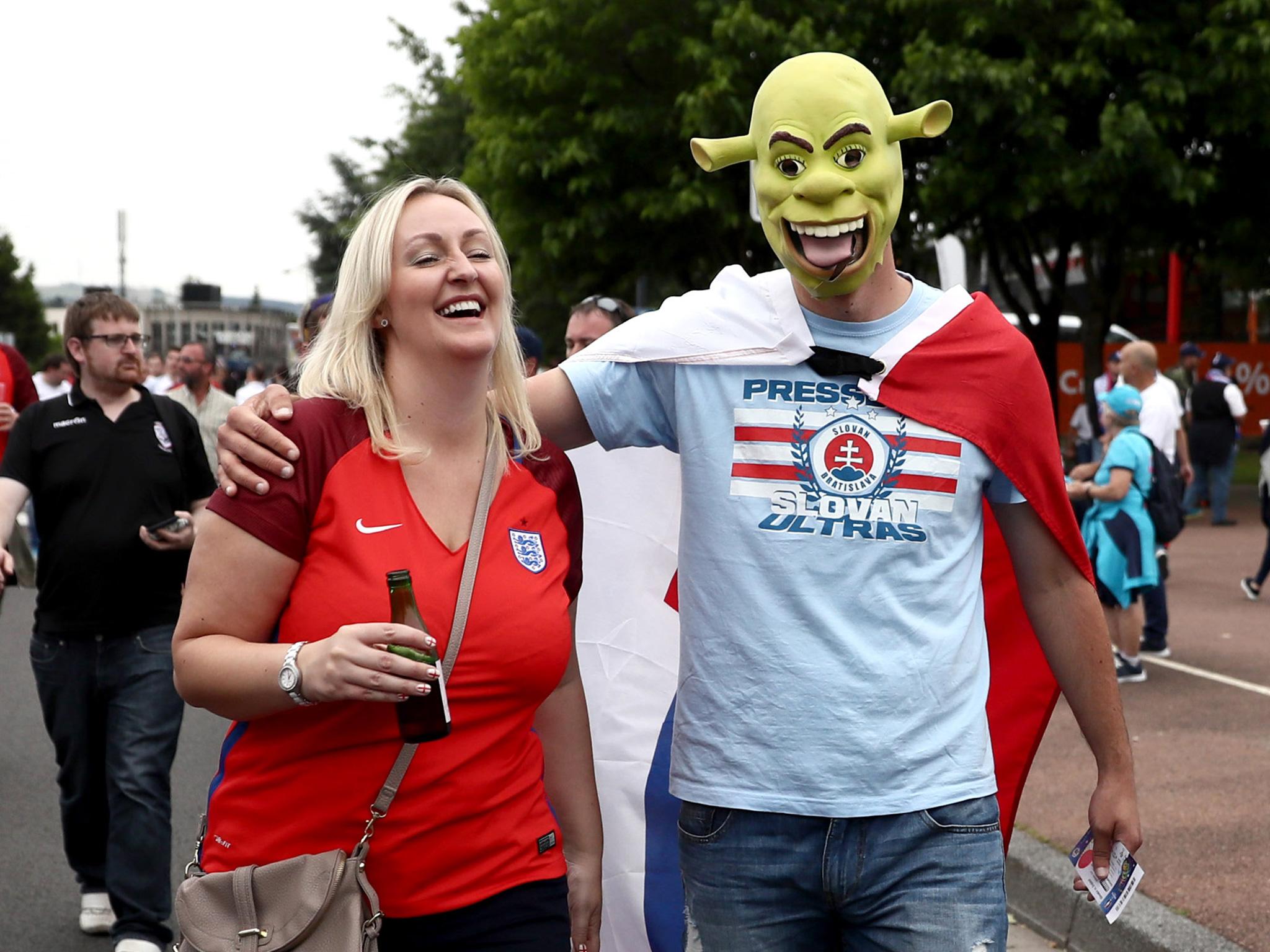EU referendum: How football and Euro 2016 has taught us to be more outward-looking people
These tournaments make us reconsider our narrow views and suspicions

A video of Dick Redmond, the Republic of Ireland kit manager otherwise known as Superman, was making a strong comeback in Germany on Wednesday.
It depicts Redmond’s extremely fine celebrations, dressed in body-hugging Man of Steel outfit, when the team qualified for the European Championships. Having been shared by thousands in Germany seven months ago, it was winning big numbers once more as part of the German national love affair with the Irish after Tuesday’s 1-0 victory over the team wearing green and white in Paris.
A few people offered a reminder that it was actually the other lot – the Northern Irish – whom Jogi Low’s side had played but no-one in the Low Countries was too bothered about differentiating because that’s not the spirit of what is unfolding. Northern Irish? Southern Irish? The Germans seem to love them all. “When I saw the fans from Northern Ireland it was amazing,” Andre Schurrle said. “They deserve to be here and they deserve to have this feeling when they win.”
It is by no means the first new and nascent European union to have been created across the French nation in the past two weeks. Events in Marseilles and Lille might have created the image that England is a country of lunatic Brexiteer imperialists, intent only on reminding the world of what the British Empire once was, but something else has emerged. The English discovered a special relationship with the Slovaks in Saint Etienne. They actually found they had something in common with the Welsh in Lille. Other unexpected alliances have been between the fans of Portugal and Austria, in Paris last Saturday, while in Toulouse they’re still talking about the rather improbable mutual affection between Swedes and Italians.
It actually goes to show that the only argument yet propounded about football’s relevance to Thursday’s European referendum – don’t ruin the Premier League’s chances of signing Europeans by voting away freedom of movement in the union – is too narrow. What Euro 2016 has revealed is the sport’s capacity to make Britons reconsider their narrow views and suspicions when they actually venture onto the continent in a way which brings them into international company. There has been much evidence in the past week that English fans are likely to return with the conviction that belonging to the European Union is fine, after all. Shame it will be too late by then.
A report on Monday night from Saint Etienne by Paul Moss, of Radio 4's The World Tonight, provided a range of views from England supporters, but plenty among them felt this experience had changed them. Though they did not put it in such a way, some of the xenophobia had melted away. “It’s been a really good experience and I’ve never known anything like it to be honest,” said one fan, who had found himself singing with fans of ten different nationalities in Paris. “It makes you feel a bit better about the European Union.”

The encounter with Poles seems to have struck a real chord. A substantial number of English fans report encounters with that nationality, which has been maligned by a xenophobic, immigrant-hating section of the British media. Mark Rowlands, an England supporter who was in Paris because he had anticipated England’s round of 16 game being there, told me near Gare du Nord on Wednesday morning that he viewed the Poles differently now. “One of our lads had his wallet taken and they wanted to lend him some euros until he was sorted,” Rowlands said. “You couldn’t have asked for more from the Polish lads here.” He actually regretted having cast a proxy vote to leave the EU, before heading here.
The picture is complicated, of course. Another fan, Matt Tory, has described how his friends’ minibus broke down between games and French and Poles walked away, not exactly convincing him that he wants to Remain anywhere with them. But the rapprochements we are witnessing reflects the way that travelling to play and watch European football removes suspicions.
We’ve travelled a long way since Bob Paisley screamed “don’t drink the tea” at his players in one European country because he was convinced it must be drugged. Sir Alex Ferguson generally only displayed xenophobic tendencies when his team had lost. “When an Italian tells me it’s pasta on the plate I check under the sauce to make sure,” he famously said.
And with experience comes intelligence. The Manchester United and Liverpool fans who have been travelling around Europe to watch their teams play for years generally love the continent and its people, now, and are so comfortable in the environment they don't need to peg out the flag of St George and sing about the war wherever they go. As my colleague Mark Ogden told the BBC recently, many of the little Englanders who sing about the “RAF from England” are from towns and cities so small that they have never been on those continental journeys. They are not sophisticates.
Paul Moss’ report observed that the French are displaying a remarkable tolerance of the Roy Hodgson red and white army as they make a corner of England in every city they play. No other nation’s fans do this and a dim view would have been taken if the French tried it in central London. “They are doing what supporters do. That isn’t a problem,” a bar manager in Marseilles told me.
Beyond the broader economic considerations which should underpin a vote in Thursday’s referendum, we need to be Europe because it makes us a more intelligent, embracing and outward-looking people. Football does not add terribly much to the sum of human understanding but it can at least teach us that.
Join our commenting forum
Join thought-provoking conversations, follow other Independent readers and see their replies
Comments